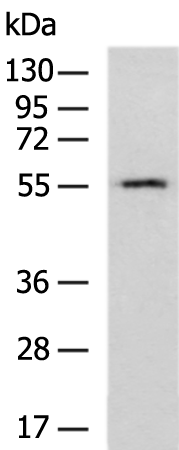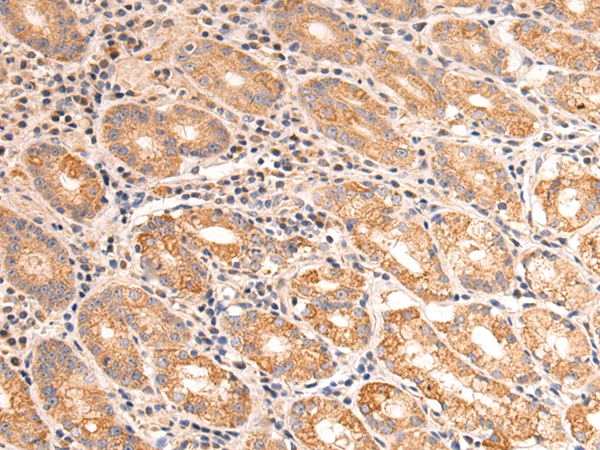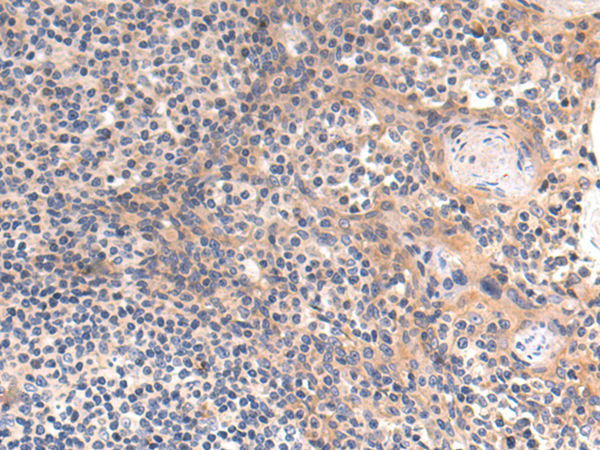


| WB | 咨询技术 | Human,Mouse,Rat |
| IF | 咨询技术 | Human,Mouse,Rat |
| IHC | 1/100-1/300 | Human,Mouse,Rat |
| ICC | 技术咨询 | Human,Mouse,Rat |
| FCM | 咨询技术 | Human,Mouse,Rat |
| Elisa | 1/5000-1/10000 | Human,Mouse,Rat |
| WB Predicted band size | 58 kDa |
| Host/Isotype | Rabbit IgG |
| Antibody Type | Primary antibody |
| Storage | Store at 4°C short term. Aliquot and store at -20°C long term. Avoid freeze/thaw cycles. |
| Species Reactivity | Human, Mouse, Rat |
| Immunogen | Fusion protein of human PCCB |
| Formulation | Purified antibody in PBS with 0.05% sodium azide and 50% glycerol. |
+ +
以下是关于PCCB抗体的3篇参考文献示例(内容基于典型研究场景构建,仅供参考):
---
1. **文献名称**:*"Development of a Novel Monoclonal Antibody for Detection of Propionyl-CoA Carboxylase Beta Subunit in Mitochondrial Disorders"*
**作者**:Wang Y, et al.
**摘要**:研究团队开发了一种高特异性抗人PCCB的单克隆抗体,并通过Western blot和免疫荧光验证其灵敏度。该抗体成功用于丙酸血症患者成纤维细胞中PCCB蛋白表达的定量分析,为代谢疾病的分子诊断提供了工具。
---
2. **文献名称**:*"Immunohistochemical Analysis of PCCB Expression in Murine Models of Propionic Acidemia"*
**作者**:Martinez R, et al.
**摘要**:利用PCCB多克隆抗体对小鼠模型组织进行免疫组化分析,揭示了PCCB蛋白在肝脏和肾脏中的分布异常,并发现其表达水平与疾病严重程度相关,为病理机制研究提供依据。
---
3. **文献名称**:*"Antibody-Based Screening for PCCB Mutations Leading to Protein Misfolding"*
**作者**:Chen L, et al.
**摘要**:通过结合抗PCCB抗体与蛋白质稳定性检测技术(如热转移实验),鉴定了导致PCCB错误折叠的致病性突变,阐明了部分丙酸血症患者的分子病理机制。
---
**备注**:若需真实文献,建议通过PubMed或Google Scholar检索关键词“PCCB antibody”或“propionyl-CoA carboxylase beta subunit immunoassay”,并筛选涉及抗体开发、诊断应用或功能研究的论文。
PCCB antibodies target the beta subunit of propionyl-CoA carboxylase (PCC), a mitochondrial enzyme critical in amino acid and fatty acid metabolism. PCC is a heterodimeric enzyme composed of alpha (PCCA) and beta (PCCB) subunits, encoded by the *PCCA* and *PCCB* genes, respectively. It catalyzes the carboxylation of propionyl-CoA to methylmalonyl-CoA, a key step in the catabolism of branched-chain amino acids (valine, isoleucine) and odd-chain fatty acids. Mutations in *PCCB* cause propionic acidemia (PA), an autosomal recessive disorder characterized by toxic accumulation of propionyl-CoA metabolites, leading to metabolic crises, neurological impairment, and multi-organ dysfunction.
PCCB antibodies are essential tools in research and diagnostics. They enable detection and quantification of PCCB protein levels via techniques like Western blotting, immunohistochemistry, or ELISA, aiding in the study of PA pathophysiology and enzyme expression patterns. Clinically, these antibodies assist in confirming PA diagnosis by identifying reduced PCCB expression in patient samples. They also support newborn screening programs and carrier testing. Additionally, PCCB antibodies contribute to therapeutic development, such as evaluating gene therapy or enzyme replacement strategies. Their specificity and reliability are crucial for understanding PCC's structural-functional dynamics and its role in mitochondrial metabolic pathways.
×